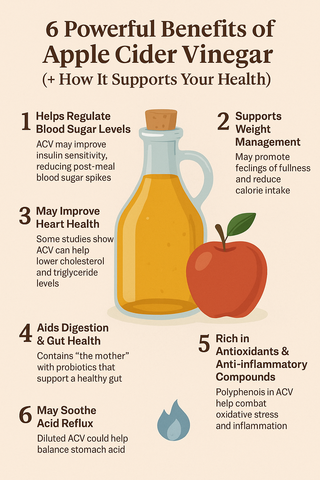Why Apple Cider Vinegar Matters
Apple Cider Vinegar (ACV) is one of those natural remedies that's been around for centuries—and for good reason. Made from fermented apple juice, this golden liquid is often praised for its wide range of health benefits. From aiding digestion to balancing blood sugar levels, ACV is a staple in many wellness routines today. It's not just about tradition; modern science is beginning to confirm what our ancestors already knew. With more people turning toward natural health solutions, ACV stands out as an easy, affordable option with real results. Whether you're new to ACV or have used it before, this article breaks down its top benefits and how to make it part of your everyday life.
1. Helps Regulate Blood Sugar Levels
One of the most widely recognized health benefits of Apple Cider Vinegar is its ability to help manage blood sugar levels. Studies show that consuming ACV before or during meals may reduce post-meal glucose spikes by improving insulin sensitivity. For example, a small study published in the journal "Diabetes Care" found that participants with type 2 diabetes who consumed vinegar before a high-carb meal had better blood sugar control afterward. The acetic acid in ACV appears to slow down the digestion of starches, which in turn prevents sharp increases in blood sugar. This is particularly valuable for people with insulin resistance or prediabetes who are looking for natural ways to manage their condition. However, ACV should never replace prescribed medications; it should complement a healthy lifestyle.
2. Supports Weight Management
Apple Cider Vinegar has gained popularity among people trying to lose or maintain weight, and not without reason. The acetic acid in vinegar is known to promote feelings of fullness, which can naturally lead to a reduced calorie intake. In one 12-week Japanese study, participants who consumed vinegar daily lost 2 to 4 pounds more than those who did not. Although this might not seem dramatic, it points to the potential of ACV as a gentle but consistent aid in weight control. Moreover, adding a tablespoon or two to your meals can make them more satisfying and flavorful without extra calories. That said, ACV is not a quick fix or miracle solution. It's best used alongside a balanced diet and regular exercise for long-term results. When consumed appropriately, it may be a small but effective tool in your overall wellness plan.
3. May Improve Heart Health
Heart health is a major concern worldwide, and early research suggests that Apple Cider Vinegar may contribute positively in this area. Some animal studies have shown that vinegar can lower cholesterol, triglyceride levels, and blood pressure—all of which are important for maintaining cardiovascular health. For example, rats fed with vinegar over several weeks showed a significant reduction in LDL cholesterol and an increase in HDL, the "good" cholesterol. While human studies are more limited, the antioxidant compounds found in ACV may help prevent the oxidation of cholesterol in the arteries, which is a known risk factor for heart disease. Incorporating ACV into your meals can be a flavorful way to support your heart, especially when combined with other heart-friendly foods like leafy greens, whole grains, and healthy fats.
4. Aids Digestion & Gut Health
Many people turn to Apple Cider Vinegar to soothe digestive troubles, and there is good reason for this tradition. ACV contains acetic acid, which has natural antimicrobial properties that can help kill harmful bacteria in the gut. More importantly, raw, unfiltered ACV contains strands of proteins, enzymes, and friendly bacteria known as "the mother." These probiotic compounds can promote a healthy gut microbiome, which plays a key role in digestion, nutrient absorption, and even immune function. Some individuals report relief from bloating, gas, or indigestion after adding diluted ACV to their routine. For best results, consider taking a tablespoon mixed with warm water before meals. However, if you have ulcers or a sensitive stomach, consult your doctor first, as vinegar's acidity may aggravate certain conditions.
5. Rich in Antioxidants & Anti-inflammatory Compounds
Apple Cider Vinegar is more than just acidic; it's rich in antioxidants, particularly polyphenols, which help combat oxidative stress in the body. Oxidative stress occurs when there's an imbalance between free radicals and antioxidants, leading to cell damage and contributing to chronic diseases like cancer, diabetes, and neurodegenerative disorders. Polyphenols from apples remain present in good-quality ACV, and these compounds have been shown to reduce inflammation and promote heart and brain health. While ACV shouldn't replace fruits and vegetables as your main source of antioxidants, incorporating it into your diet can complement a nutrient-rich lifestyle. The anti-inflammatory effects may also benefit joint health and support the immune system.
6. May Soothe Acid Reflux
Acid reflux and heartburn are uncomfortable conditions that occur when stomach acid flows back into the esophagus. Surprisingly, although ACV is acidic itself, some people report that a small amount diluted in water can actually help reduce symptoms. The theory is that low stomach acid is often mistaken for too much acid, and a bit of vinegar might help balance the pH levels in the stomach. While there isn't much scientific research to back this up, anecdotal evidence supports its use for occasional heartburn. Still, this remedy isn’t for everyone, especially those with chronic GERD or stomach ulcers. Always consult a healthcare professional if you experience frequent digestive discomfort.
How to Use ACV Safely
-
Always dilute 1–2 tablespoons in water or tea.
-
Use in dressings & marinades for a tasty twist.
-
Rinse your mouth afterward and drink through a straw to protect your enamel.
-
Start small and consult your doctor if taking medications like insulin or diuretics.
Potential Side Effects
-
Dental erosion/throat irritation from undiluted ACV.
-
Low potassium or bone density risk from daily high intakes.
-
Drug interactions, e.g., diabetes, diuretics, heart medicines.
6 Easy Ways to Include ACV in Your Routine
| Method | Tips |
|---|---|
| Water/Tea drink | Mix 1–2 tbsp in a mug of warm water or herbal tea |
| Salad dressing | Combine with olive oil, mustard, honey & herbs |
| Marinade | Use with garlic, soy sauce & olive oil for meats and veggies |
| Smoothies | Add a splash to sweet fruit blends like berries or banana |
| Fire-cider tonic | Infuse with ginger, turmeric & honey for cold support |
| Spot treatment | Use diluted topically for dandelion/calloused nails (patch test first) |
FAQs
1. Is ACV safe for kids?
Only when diluted. Undiluted vinegar can irritate. Consult a pediatrician.
2. Can pregnant women use ACV?
Yes, diluted. It helps digestion and energy, but ask your doctor first.
3. Can it whiten teeth?
Rinsing mouth afterward is key. Don’t swish ACV alone.
4. Does the “mother” matter?
Yes—it adds probiotics. Choose raw, unfiltered ACV.
5. What’s the best time to take ACV?
Before meals may aid fullness and digestion. Avoid bedtime to prevent reflux.
6. Gummies vs. liquid?
Gummies often contain sugar, lowering benefits. Liquid allows better dosage control .
Conclusion
Apple Cider Vinegar offers several potential health perks—blood sugar control, digestion aid, heart support, and antioxidants—when used safely and in moderation. Choose raw, unfiltered ACV with “the mother,” dilute properly, and enjoy it as a flavorful, wellness-boosting addition to your daily routine.
Explore Torshi’s ACV-Infused Products!
At Torshi, we offer premium artisanal snacks, dressings, and side dishes infused with raw, unfiltered Apple Cider Vinegar. Whether you're adding zing to salads or enjoying gut-friendly flavours, our products deliver gourmet taste and health benefits in every bite. Visit our shop to explore: www.torshi.com

